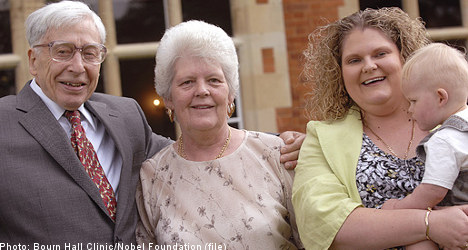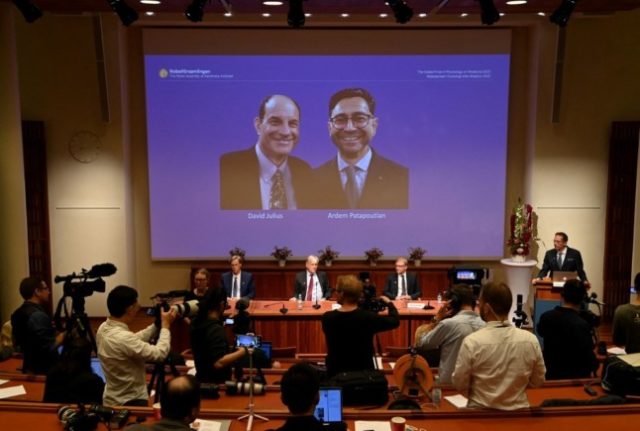Robert Edwards, will not attend the ceremony to receive his prize due to health reasons, according to the Nobel Foundation.
Edwards was awarded for his contributions to in-vitro fertilisation (IVF) technology, which have since resulted in nearly 4 million births.
The 85-year-old, whose work led to the birth of the first test-tube baby in 1978, was also too weak to give interviews when it was announced in October that he had won the prize. His wife Ruth will travel to Stockholm to collect the prize on his behalf.
Separately, China’s ambassador to Sweden, Chen Mingming, has declined his invitation to attend the event.
Although Nobel Foundation CEO Michael Sohlman declined to speculate on the reason behind the refusal, China has objected to the selection of dissident Liu Xiaobo for the Nobel Peace Prize, which is chosen and awarded in Oslo, Norway.
“He turned it down, quite simply,” said Sohlman.
All ambassadors stationed in Stockholm have received an invitation. The Nobel Peace Prize is also handed out on December 10th, but at a separate ceremony in Oslo.
Six countries — China, Cuba, Iraq, Kazakhstan, Morocco and Russia — are so far known to have declined the invitation to attend the Oslo ceremony.
China said Thursday it was “difficult to maintain friendly relations” with Norway following the decision to award this year’s Peace Prize to Liu.
Liu remains incarcerated as a political prisoner in China. His wife Liu Xia, who had expressed a desire to receive the award on her husband’s behalf, was placed under house arrest after visiting her husband in jail to inform him that he had won the prize.
Nobel Week kicks off on Monday for the other nine winners. As usual, the awards ceremony and banquet take place next Friday.
A total of 1,350 guests, of which 220 are students, will attend the Nobel banquet. The guest lists includes several ministers from the countries of the laureates, including Peru’s culture minister and Japan’s education and science minister.
Japan’s Ei-ichi Negishi and Akira Suzuki share the 2010 Nobel Prize in Chemistry with American Richard Heck, while Peru’s Mario Vargas Llosa was awarded the prize in literature.
The 2010 physics prize is shared by Russian-born Andre Geim of the Netherlands and Konstantin Novoselov, who also holds British citizenship.
EU Commissioner Máire Geoghegan-Quinn, who is responsible for research, will attend, along with Cypriot EU Commissioner Androulla Vassiliou. Vassiliou is a cousin of economic laureate Christopher A. Pissarides, who shares the prize with Americans Peter A. Diamond and Dale T. Mortensen.
Sohlman also defended on Friday his decision not to invite Jimmie Åkesson, the head of Sweden’s far-right anti-immigrant Sweden Democrat party, to the ceremony. The party was elected to Sweden’s parliament, the Riksdag, for the first time in September.
All leaders of the Swedish parliamentary parties are traditionally invited to the sumptuous gala. Royal family members are also regular attendees.
“The reasons are very obvious. They are working at 180 degrees against us, or rather, [against] the values we stand for,” he said.
“If you go on their website, the Sweden Democrats have a sort of pragmatic programme…where it’s stated that their ideal is ethnically and culturally homogeneous people,” Sohlman said, whereas Alfred Nobel wanted his prizes to be “cosmopolitan, international” awards.
The far-right party “clashes head on with the philosophy of this institution,” he said.
In addition to his or her significant other, each prize winner is allowed to invite up to 14 individuals to the ceremony. Mortensen will be accompanied by his eight grandchildren aged nine to 17.



 Please whitelist us to continue reading.
Please whitelist us to continue reading.
Member comments